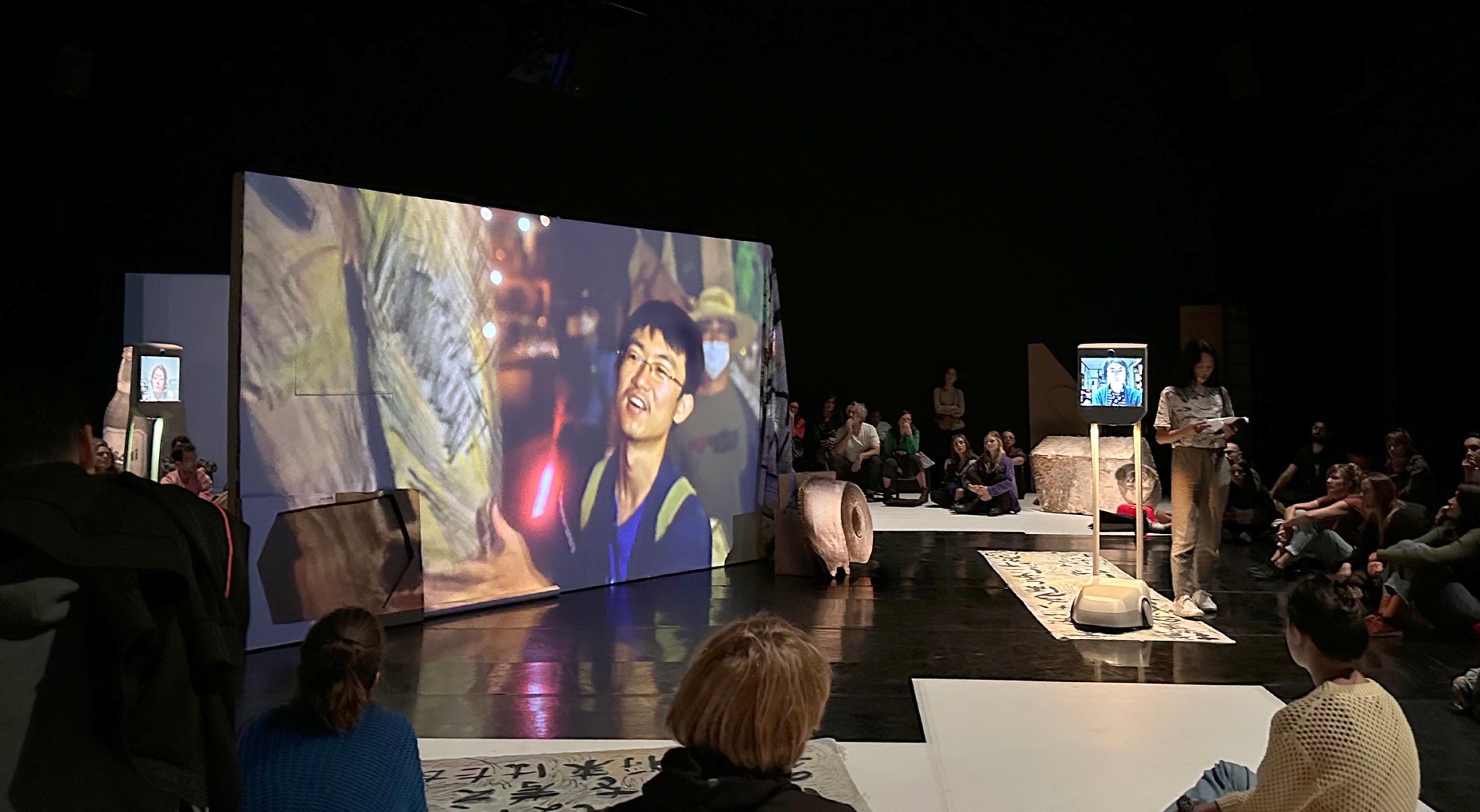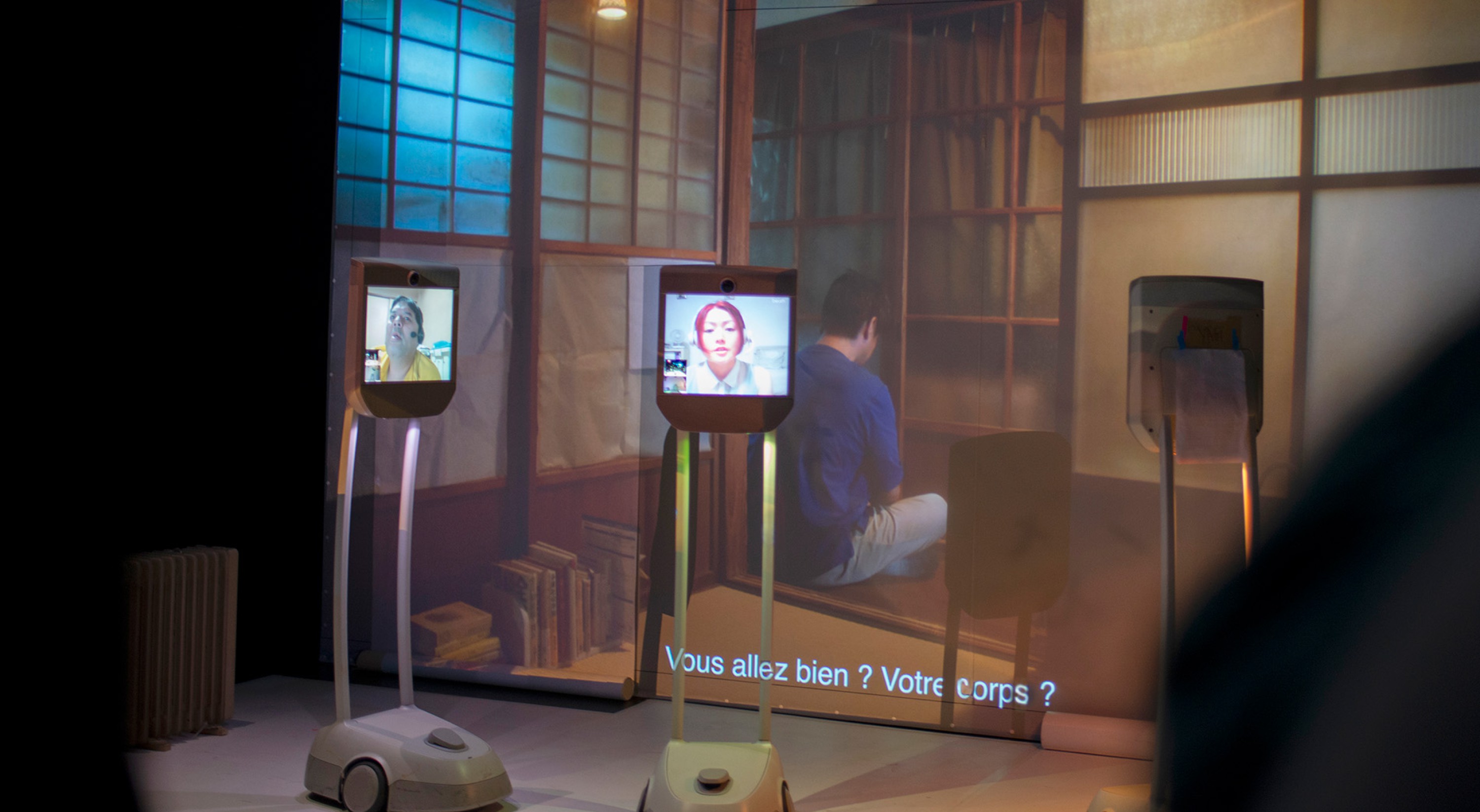Anne-Sophie Turion Eric Minh Cuong Castaing
HIKU
octoberoct 19 – 21
novembernov 17 – 18
novembernov 24 – 25
decemberdec 15
Design, Anne-Sophie Turion, Eric Minh Cuong Castaing
Live performance and translation, Yuika Hokama
Telepresence performance, Shizuka Fujii, Mastuda Ippei, Tomohiro Yagi
Collaboration in Japan; mediation; co-organization of the event, Atsutoshi Takahashi and the New start Kansai association
Dramaturgical accompaniment, Marine Relinger, Elise Simonet
Set design, Pia de Compiègne, Anne-Sophie Turion
Outside view, Youness Anzane
Drawings, Yoshiyuki Ogawa
Lighting design, Vera Martins
Sound design, Renaud Bajeux
Stage manager, Virgile Capello
Assistant stage manager, Magalie Sfedj
Video control, Renaud Vercey
Chief cameraman Japan, Victor Zebo
Second shooting assistant & technical support - Japan, Yuya Morimoto
Camera operator first shoot, Yuji Suzuki
Translation in Japan, Tadashi Sugihara, Naoko Tanabe, Thomas Poujade
Editing, Lucie Brux
Calibration, Alexis Lambotte - studio 42
Production, cie Shonen, in collaboration with cie Grandeur nature
Production administrator, Claire Crova
Administrative and financial manager, Maxime Kottmann
HIKU receives support from the French Ministry of Culture through the "Mondes Nouveaux" program.
To support artistic creation in the wake of the health crisis, the cultural component of the France Relance plan has earmarked 30 million euros for Mondes nouveaux, an innovative support program for the conception and realization of artistic projects, supporting 430 creators and 264 projects throughout France.
Coproductions, Groupe des 20 Théâtres en Île-de-France - Lauréat 2022 ; La Comédie de Valence, Centre dramatique national Drôme-Ardèche ; Charleroi danse, center chorégraphique de Wallonie ; CNCA - Centre National pour la Création Adaptée (Morlaix) ; Festival d'Automne à Paris ; Mille Plateaux, Centre Chorégraphique National La Rochelle ; Maison de la culture du Japon à Paris ; 3bisf- Centre d'arts contemporains d'intérêt national à Aix en Provence ; CHRONIQUES CRÉATIONS platform (In coproduction with Parallèle, 3-bisf and Scène 44) / PARTNERS: Théâtre du Châtelet for the loan of the telepresence robots; Villa Kujoyama (Kyoto); Fondation Franco-Japonaise Sasakawa; Association New Start Kansai (Takatsuki) / PUBLIC FINANCING : Théâtre Export with the support of the Institut français à Paris; DICRéAM - CNC; La Fondation des artistes; Scam - Bourse brouillon d'un rêve / Hosted by: Montévidéo (Marseille); cie La Zouze-dans les parages (Marseille); Montpellier Danse; KLAP Maison pour la danse (Marseille).
Special thanks to Takahashi-san and Kumiko-san médiateurices of the New Start Kansai association, Nicolas Tajan (Program-Specific Associate Professor, Kyoto University President, International Mental Health Professionals Japan), the student council of the
Yoshida Dormitory at Kyoto University, Chloé Siganos, Charles Mesnier, Awabot, and the kind members of our Board of Directors: Aurélien Guillois, Colette Limousin, Charlotte Fouchet-Ishi, Annie Bozzini, Christine Vidal, Laurence Leny, Jan Goossen.
The Shonen company is subsidized by the DRAC Provence-Alpes-Côte d'Azur and receives operating support from the City of Marseille. It receives project funding from the Région Sud and the Département des Bouches-du-Rhône. The company has received support from the Fondation Daniel Daniel et Nina Carasso - artiste citoyen engagé en 2023. Eric Minh Cuong Castaing is a member of the Ensemble artistique de la Comédie de Valence and has been an associate artist of ICK Amsterdam since 2020.
Both cinema and performance, fiction and documentary, HIKU brings to the stage the Japanese phenomena of the hikikomori, self-inflicted recluses living in isolation from any form of social contact. Via the medium of remote-controlled robots, three such individuals find a public presence and means of action.
HIKU sets up an encounter which is seemingly impossible. Onstage, or more precisely in telepresence, Shizuka, Mastuda and Yagi, three hikikomori in the midst of re-sociabilisation, speak up, interacting with the audience by moving around elements of the stage set and unrolling banners. Each of them pilots their own robot from the confines of their bedroom, thousands of kilometers away, while Yuika, their performer and game partner, accompanies them onstage in flesh and blood. Mixed in with the stage-bound actions, various cinematographic sequences open a window on their intimacy. The latter is revisited or imagined in order to navigate a path between the memories of their time spent in isolation, and their sensations of the present. Haunted by the motif of the hikikomori-demo, a happening which recluses use to proclaim their right to social withdrawal, the piece is not so much a condemnation of this conscious act of disappearance, this escape from reality, as an attempt to view it as a dissident form of self-effacement, and way of resisting against the injunctions of the contemporary world.
In the same place

